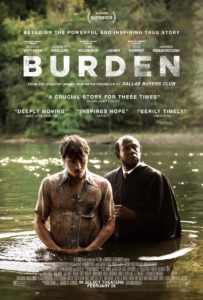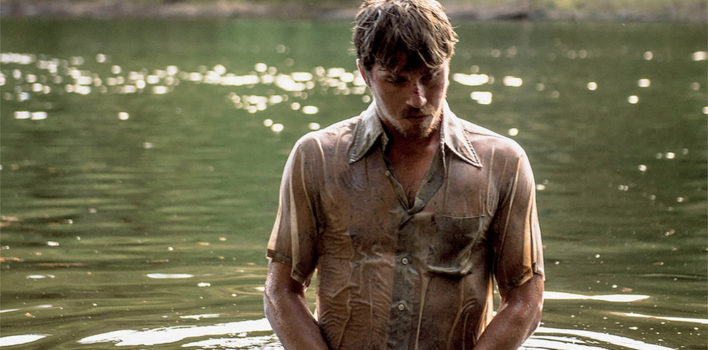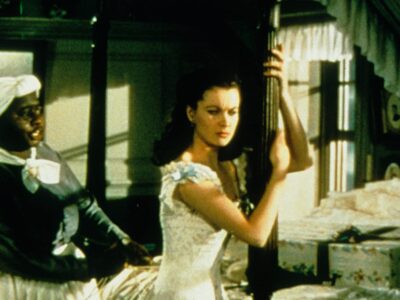Review| Burden
 Like I talked about in my review of last year’s Skin, it is difficult telling a story of America’s ugly past dealing with racism, and the terrorism that the Ku Klux Klan visited upon our African American brothers and sisters. It is even harder for a white director to really capture the humanity of all sides of an historical event without unconsciously (or consciously) devoting more time to the humanity of the story’s white characters. This was the biggest flaw of Skin, as it largely sidelined its only significant black character; it’s the flaw of more mainstream fare like Kathryn Bigelow’s Detroit when a black story is ultimately backgrounded by the end so that we can concentrate on the film’s white perpetrators. With Burden, once again, we find ourselves with an important story of America’s racist past being helmed by a white director, Andrew Heckler.
Like I talked about in my review of last year’s Skin, it is difficult telling a story of America’s ugly past dealing with racism, and the terrorism that the Ku Klux Klan visited upon our African American brothers and sisters. It is even harder for a white director to really capture the humanity of all sides of an historical event without unconsciously (or consciously) devoting more time to the humanity of the story’s white characters. This was the biggest flaw of Skin, as it largely sidelined its only significant black character; it’s the flaw of more mainstream fare like Kathryn Bigelow’s Detroit when a black story is ultimately backgrounded by the end so that we can concentrate on the film’s white perpetrators. With Burden, once again, we find ourselves with an important story of America’s racist past being helmed by a white director, Andrew Heckler.
To Heckler’s credit, Burden becomes a much more successful exercise in giving equal time and humanity to the characterizations of both its black and white characters. The setup is quite similar to that of Skin in that a black man plays a significant role in the release and eventual redemption of a white man from the bonds of hate. Considering the ever-looming potential of slipping into the “magical negro” cliché, this setup could end up turning into just another version of The Legend of Bagger Vance or The Green Mile where we witness the evolution of our white protagonist with the help of a black person who has no evolution of motives embedded in their own character. Where Heckler succeeds in Burden is how he gives Rev. Kennedy (Forrest Whitaker) his own motivations that transcend the needs of Mike Burden (Garrett Hedlund), our white anti-hero. He is not so much concerned with Burden in and of himself, but in the care and leadership of his flock as he teaches them about love and nonviolence in the face of the town’s KKK presence, led by Tom Griffin (Tom Wilkinson). Mike becomes a figurative incarnation of his last name for Rev. Kennedy in that his presence in the life of Kennedy puts him, initially, at odds with his family and friends. Yet, principally, this is the very thing that Kennedy is preaching and he is only acting on those principles. He has motivations that are separate from the redemption of Mike Burden even if Burden is redeemed in the process.
 The humanity goes deep in this film and Heckler does a good job of balancing the complexities of telling a story like this and having co-equal leads that are compelling in their own ways, separately and in the same scenes. This goes to the credit of both Whitaker and Hedlund who create whole characters that are easy to access and appreciate in their times of repulsion and redemption. If the film has any significant weakness it might be the sidelining of the wonderful Andrea Riseborough in her character, Judy, who falls a little flat simply due to the fact that her character almost necessarily gets glossed over due to the main drive of the film’s narrative. However, Riseborough remains just as compelling to watch in her mannerisms even when the material doesn’t give her much to do.
The humanity goes deep in this film and Heckler does a good job of balancing the complexities of telling a story like this and having co-equal leads that are compelling in their own ways, separately and in the same scenes. This goes to the credit of both Whitaker and Hedlund who create whole characters that are easy to access and appreciate in their times of repulsion and redemption. If the film has any significant weakness it might be the sidelining of the wonderful Andrea Riseborough in her character, Judy, who falls a little flat simply due to the fact that her character almost necessarily gets glossed over due to the main drive of the film’s narrative. However, Riseborough remains just as compelling to watch in her mannerisms even when the material doesn’t give her much to do.
Burden remains a worthy addition to the canon of cinematic representations of African American history and the sins of the American past even if it doesn’t quite reach the levels of the greatest films in that canon.







